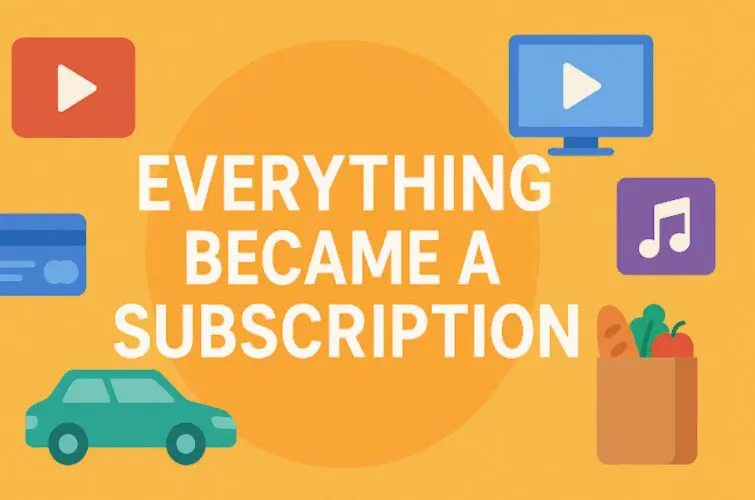How Everything Became a Subscription
Subscriptions are changing how people buy products. Companies today prefer charging monthly fees instead of one-time purchases. This shift impacts everything from software, non GamStop casinos and music to cars and housing.

Why Companies Prefer Subscriptions
Subscriptions are popular because they benefit both businesses and investors. There are four main reasons why companies favour this model.
Easier Sales of Expensive Products
Expensive items become more affordable with monthly payments. For instance, Netflix would cost around £1,500 to £2,000 if bought upfront. However, customers willingly pay about £10 per month instead. This pricing strategy attracts more buyers who avoid large one-time payments.
Predictable Income for Businesses
Monthly fees mean steady income. Traditional sales fluctuate, causing uncertain cash flow. Subscription companies know exactly how much money they receive each month. Predictable revenue helps them manage expenses and plan growth without relying heavily on external funding.
Stronger Customer Relationships
Subscription models allow companies to gather detailed customer data. Businesses can monitor product usage and preferences. This helps them improve their products and promote additional services. Customers also become loyal over time, sticking with familiar services even when competitors offer better features.
Investor Attraction
Investors prefer subscription businesses because they are predictable and scalable. Venture capital firms often fund these businesses to help them grow quickly. Once companies become large, investors sell them for profits through public offerings or private equity deals. This cycle encourages even more subscription-based startups.
Common Subscription Examples
Subscriptions now extend far beyond traditional services. They include items people traditionally bought outright.
| Product Type | Subscription Example |
| Entertainment | Netflix, Spotify |
| Software | Adobe Photoshop, Salesforce |
| Transport | Monthly car services |
| Everyday goods | Shaving products, groceries |
| Travel | Subscription-based flights |
| Housing | Global co-living memberships |
Recently, BMW introduced subscriptions for features already built into their cars. Drivers can pay monthly fees to activate heated seats. Similarly, Toyota plans subscriptions to unlock in-car features previously sold outright.
Benefits and Drawbacks of Subscriptions
Subscription services offer clear advantages but also bring significant disadvantages.
Benefits
- Lower upfront costs: Customers avoid large initial expenses.
- Regular updates: Companies regularly upgrade products to maintain subscribers.
- Easy budgeting: Consumers spread costs over months, easing financial strain.
Adobe Photoshop previously cost about £250 to £300 per software version. Subscribers now pay around £20 monthly and get regular feature updates. Over several years, the monthly option often proves cheaper and more convenient.
Drawbacks
- Higher long-term costs: Monthly fees add up quickly, costing customers more over time.
- Hidden expenses: People underestimate monthly payments, often spending more than they realise.
- Dependency on subscriptions: Customers lose control over product ownership.
A recent survey found British consumers spend approximately £220 monthly on subscription services. Surprisingly, most people underestimated this amount by about £100 per month. This oversight adds up significantly, costing nearly £1,200 annually.
Controversial Examples of Subscription Models
Subscriptions have reached controversial extremes in recent years.
Car Features as Subscriptions
Luxury car brands now charge subscription fees for built-in features. BMW tested a subscription fee of roughly £15 per month to activate heated seats in its vehicles. Such charges sparked considerable backlash from customers who already paid substantial amounts for their cars.
Housing as a Subscription
A San Francisco startup offers a global co-living subscription costing around £1,300 monthly. Members gain access to shared living and working spaces worldwide. This service targets digital nomads who prefer flexibility over homeownership. However, it raises concerns about long-term housing affordability and security.
Impact on Consumers’ Financial Stability
Subscriptions pose financial risks, especially for low-income households. Many consumers unknowingly overspend on subscriptions they rarely use. Companies often deliberately minimise contact with inactive customers to continue charging monthly fees. This situation creates financial traps for individuals who lack funds to buy outright and depend solely on monthly payments.
Are Subscription Models Sustainable?
Subscription popularity may have reached its peak. Early signs indicate declining growth for major subscription companies. Netflix recently reported its first-ever quarterly subscriber loss. Increased competition, account sharing, and economic pressures contributed to this decline. These factors suggest subscription-based businesses could struggle during periods of economic uncertainty.
Consumer Awareness Growing
Consumers increasingly track their subscription expenses. Budgeting tools help people identify and cancel unnecessary services. When finances tighten, subscriptions become prime targets for cost-cutting, indicating vulnerabilities in this business model.
Higher Interest Rates’ Effect
Higher interest rates make upfront payments more appealing to businesses. Immediate cash flow becomes essential as borrowing costs rise. Companies may reconsider subscription models if higher interest rates persist, prioritising immediate income over future revenues.
The Future of Subscription Services
Subscriptions will likely remain prominent despite current challenges. However, their growth could slow significantly. Companies might shift back towards balanced pricing models, mixing one-time purchases with optional subscriptions. Customer preferences and economic factors will heavily influence these decisions.
Possible Future Trends
- Flexible hybrid models: Companies offer both subscriptions and outright purchases.
- Enhanced customer controls: Better transparency and easy cancellation policies become common.
- Regulatory scrutiny: Governments might regulate subscription practices, protecting consumer rights.
Conclusion
Subscriptions have reshaped how companies sell products and how consumers buy them. The convenience of monthly payments attracts customers and investors alike. Yet, growing awareness of hidden costs and financial impacts may moderate subscription expansion. Businesses that balance consumer benefits with transparent practices are likely to succeed long-term.
Frequently Asked Questions
What is a subscription service?
A subscription service charges customers regular fees, typically monthly or annually, to access products or services instead of purchasing them outright.
Why do businesses prefer subscriptions?
Subscriptions provide companies with predictable income, easier customer retention, better customer insights, and greater appeal to investors.
Are subscriptions cheaper than one-time purchases?
Subscriptions initially seem cheaper due to lower monthly fees, but they often cost more over time compared to buying a product outright.
Can subscriptions cause financial issues for consumers?
Yes, subscriptions can lead to overspending, especially when consumers lose track of multiple monthly payments, resulting in financial strain.
Why did BMW charge subscriptions for car features?
BMW introduced subscriptions for features like heated seats to create ongoing revenue from software-controlled elements already installed in their cars.
Will subscription popularity continue to grow?
Subscription growth may slow down as consumers manage expenses better and companies face economic pressures like higher interest rates.
Read more on
MyCarHeaven are on Instagram. Go check us out and do follow us.
Go visit the MyCarHeaven Instagram page. We post regular quality content, predominantly focused on classic cars, supercars, hypercars and car shows. We also feature all our competitions here, where you will have the chance IF YOU FOLLOW US and you follow the competition entry criteria, you could be in with a chance of winning tickets to the best UK car shows, and other automotive stuff.
Go to the MyCarHeaven Instagram account here. Advertisement
Advertisement Advertisement
Advertisement Advertisement
Advertisement Advertisement
Advertisement




